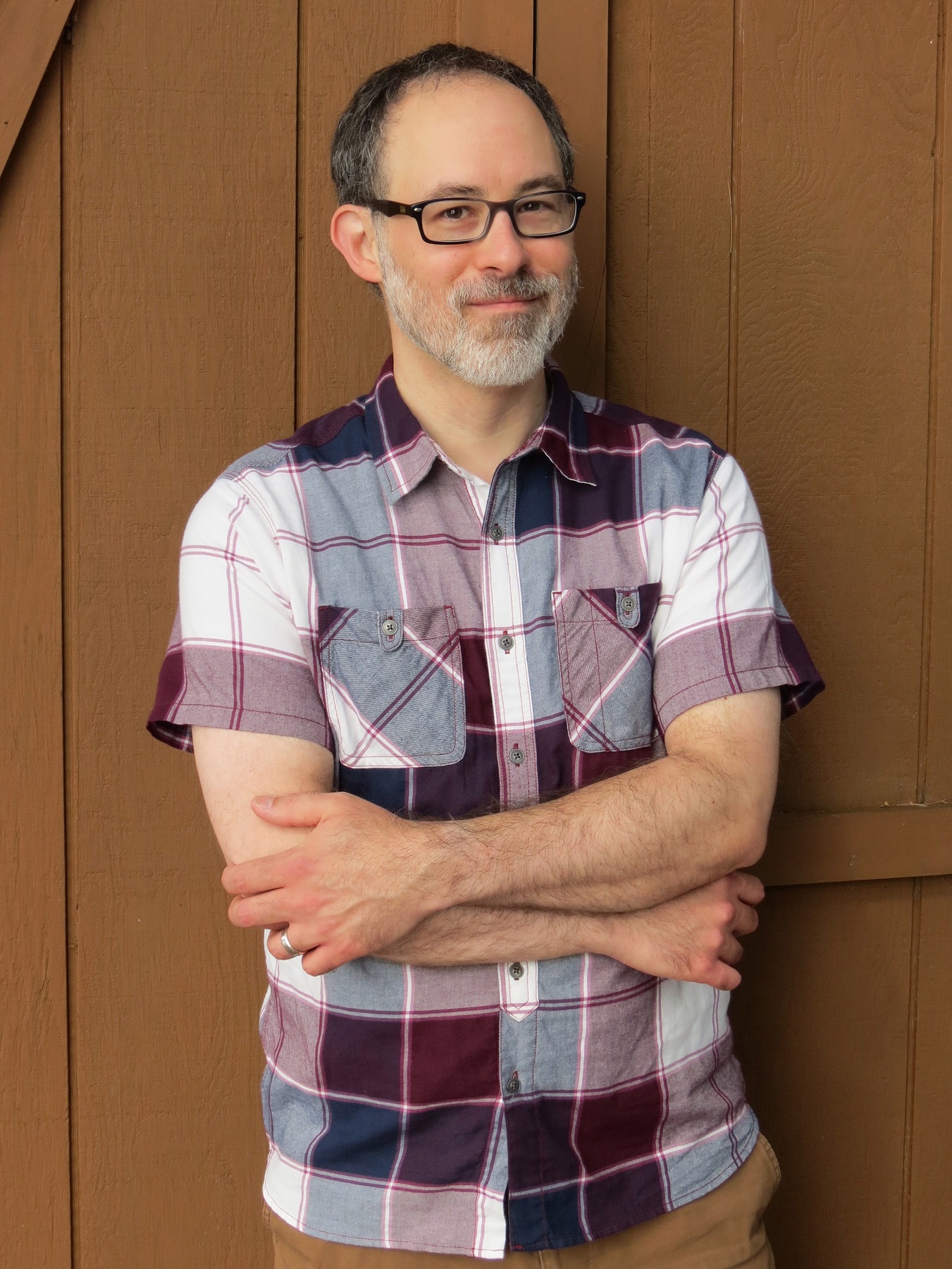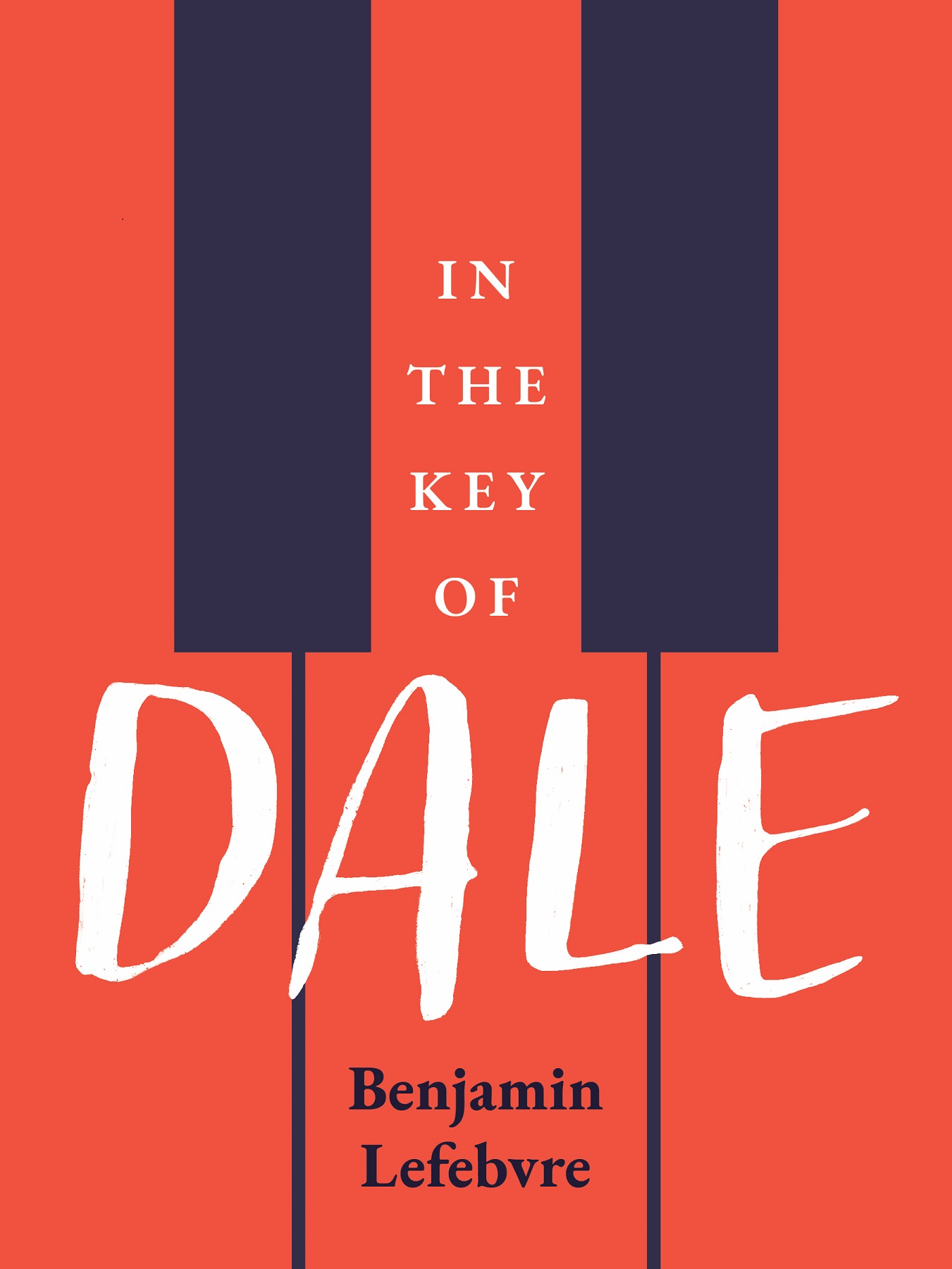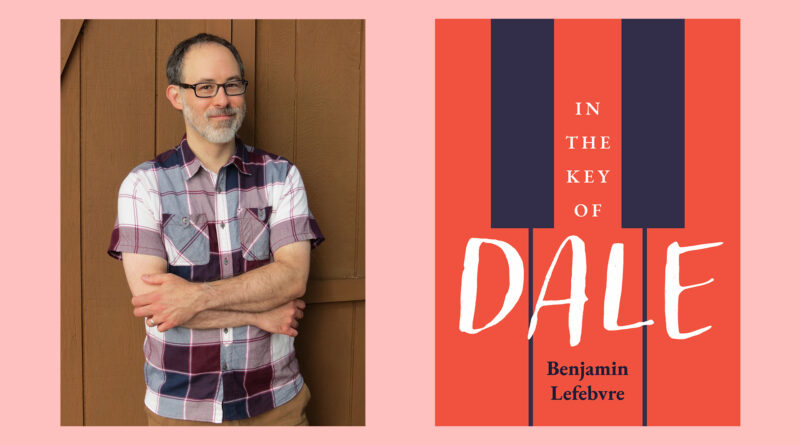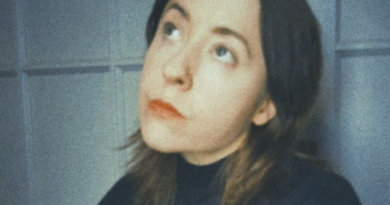Benjamin Lefebvre discusses his YA debut novel “In the Key of Dale” with a kindred spirit at SesayArts

When I’m offered the chance to to profile Benjamin Lafebvre and his debut novel, the idea speaks to me for reasons I initially can’t put my fingers on. After all, it’s a packed season of new book releases and new theatre, with the school year relentlessly marching on. But the novel in question sounds like a young-adult page turner. Titled In the Key of Dale (Arsenal Pulp Press), it’s the story of a queer sixteen-year-old music prodigy who starts writing letters to his late father.
I say Yes to covering the book, including a short excerpt for readers. Then, after clicking Send on my email, I circle back to the author’s bio. I see that Lefebvre is a scholar, as well as a writer. Based in Kitchener, Ontario, he holds an M.A. in English from the University of Guelph, a Ph.D. in English from McMaster University, and a graduate certificate in publishing from Toronto Metropolitan University. As a critic, he writes regularly about Canadian literary culture and North American texts for young people. He makes his home in Kitchener, Ontario, and his short stories appear in The Antigonish Review, Plenitude Magazine, and The New Quarterly.
I stop in my tracks when I learn that Lefebvre is a pre-eminent scholar of beloved Canadian author L.M. Montgomery, whose works, especially Anne of Green Gables series, is a personal (and lifelong) favourite of mine. He is the editor of The L.M. Montgomery Library (University of Toronto Press) and curator of L.M. Montgomery Online, a web resource providing information about Montgomery’s life, work, and legacy for her worldwide community of readers. He edited the three-volume critical anthology The L.M. Montgomery Reader, which won the 2016 PROSE Award for Literature from the Association of American Publishers. And – my heartbeat quickens – he edited an edition of Montgomery’s rediscovered final book, The Blythes Are Quoted.
At this point, I run to my bookshelf to verify that, yes, I bought this book just two weeks prior, after discovering it by chance on a bookstore shelf. At the time, I was surprised, then delighted to learn that I had one more Anne story to savour (though I didn’t dwell on the name of the book’s editor).
Only when I am reading the detail of the press release for In the Key of Dale do I realize that LeFebvre and I are both touched by this common passion. And suddenly, this opportunity to discuss his new – and very un-Anne of Green Gables – novel seems more than mere happenstance.
In the Key of Dale was published by Arsenal Pulp Press in fall 2022, and an audiobook is available from Orange Sky Audio, with an Italian translation forthcoming later this year. Following the novel’s release, Lefebvre spoke with me about the deeply personal genesis of the story, the characterization of the protagonist Dale, and his greatest challenge in writing the book. A short excerpt from the book follows the author interview, reprinted with permission from the author and Arsenal Pulp Press.
SM: Who or what inspired the story of In the Key of Dale?
BL: The easy answer to that question is that I wanted to write the novel I wish I’d been able to read when I was a teenager: one in which being queer wasn’t the big social problem that had to be solved by the end of the story (and those were rare enough at the time), but instead, one that focused on a queer male character trying to live authentically in the midst of all kinds of factors that were outside his control. I also had always wanted to read a novel that tackled something heavy like the death of a parent but contained some humour as well.
The more complicated answer is that I was looking for a creative way to work through some of the long-term grief I felt in the aftermath of the death of my own father, who died when I was thirty-one. I quickly saw that I wasn’t particularly interested in writing about him or me or about our own relationship, so I played that game that’s common among fiction writers, called “What If?” What if my protagonist had lost his father much sooner in his life than I’d lost mine? What if his mother had since remarried, which led to more changes in his day-to-day life? What if there were some unresolved issues with his father that the teen character initially wasn’t aware of? And so the story grew from there.
SM: Were any of the characters in the book based on anyone in real life?
BL: Not really. Dale and I have a lot in common—we’re both left-handed and can be socially awkward, we refer to our parents as “Ma” and “Pa,” and we went to a music-intensive elementary school—but his talents as a musician far surpass mine, and his motivation and the situations he finds himself in are made up. And none of the adults in the book is based on anyone in particular. I feel fortunate that for the most part there’s minimal conflict in my family relationships, but in a work of fiction, you need conflict to drive the story forward—something I felt the need to emphasize to my family members before they read the book!
SM: In the Key of Dale is a coming-of-age story. If you could offer Dale some advice, what would you tell him?
BL: What I remember so well about being sixteen was feeling incredibly impatient for high school to end, yet simultaneously finding the future pretty daunting. Dale, as written, already follows the advice I’d give him (and that, in hindsight, I wish someone had offered me when I was his age): to resist letting his dreams about the future prevent him from living in the moment, to find something to anchor him in the present (he has music; I had fiction writing), to take some risks, to give people a chance, and basically to look for ways to make difficult situations more tolerable.
SM: Thank you for your generosity in treating our readers to an excerpt. Why did you select this portion of the book to share?
BL: I probably wouldn’t have thought about this particular excerpt, but I came across it recently in a review of the book, and I thought it worked well because it points to conflict that Dale needs to work through without giving any of it away. At first glance, the excerpt sounds like it’s from the beginning of the story, but it isn’t.
SM: Readers don’t often think about the effect of writing a manuscript on the writer. What was the process of writing this novel like for you?
BL: I found it cathartic in some ways on a personal level, but because I was trying to create a character who wasn’t a carbon copy of me, I was also able to explore multiple ways of grieving. When my own father died, my siblings and I all demonstrated our brief and processed the loss in our own way. What I realized at the time is that there isn’t a single right way to process the loss of a parent, but instead, we all have to find the way that’s right for us. At one point, in the novel, Dale lights a candle on what would have been his father’s birthday. That’s not something I’ve ever done or felt the need to do, but it felt right for Dale.
SM: What was the greatest challenge with writing this book?
BL: I like to think that I remember well the special awkwardness of being a teenager, so trying to find the voice and the perspective of someone who’s sixteen going on seventeen was straightforward enough for me. But even though I don’t think adolescence has changed that much since I was a teenager, what has definitely changed is how technology shapes the way teenagers access information and how they communicate with each other. When I was in high school, we didn’t have email, let alone social media and streaming apps, whereas cellphones were the size of large hair dryers and could be used only for phone calls (and I don’t think anyone at my school had one). Texting and instant messaging were entirely unheard of, so a big challenge for me was always remembering the ways that technology would impact a teenager’s daily life and how it could be used to drive the story forward.
The following excerpt is reprinted with permission from the book In the Key of Dale by Benjamin Lefebvre (Arsenal Pulp Press, 2022)

I went downstairs and closed the door to my room. I took the framed photo of you from the wall above my desk and set it face down in the drawer. I texted Rusty, thanking him again for being a friend to me yesterday and telling him I’d see him tomorrow. Then I turned my phone off, lay down on my bed, and listened to the footsteps upstairs like they were a private percussion recital for my enjoyment. Soon enough I heard Ma and Helmut leave the house and go to work. I continued to lie there, staring at a dot on a ceiling tile, and wondering if at some point it would start to move.
I must have fallen asleep like that. I don’t remember dreaming anything. When I opened my eyes it was almost eleven and I felt dull and overtired. The worst part was that for a moment I’d forgotten everything, but then I remembered again. I went upstairs, checked all the rooms in the house to make sure I was alone. I cued up some ambient music on YouTube to keep me company, but an upbeat cappuccino commercial came on, so I turned it off. I tried to make tea using the impossible contraption that takes up half the kitchen counter, then gave up and proceeded to boil water in a saucepan on the stove and found a tea bag so old it probably came from our old house. So now I’m sitting at the kitchen table with my laptop, and unless Helmut or Ma comes home early, I should have about five hours of silence ahead of me. There are a number of parts to what happened over the weekend, but I’m ready to start at the beginning.
© Arpita Ghosal, SesayArts Magazine, 2023
About The Author
Arpita Ghosal
Arpita Ghosal is a Toronto-based arts writer. She founded Sesaya in 2004 and SesayArts Magazine in 2012.
Visit About Us > Meet the Team to read Arpita’s full bio …




